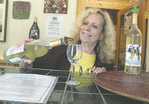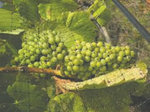Judith and Ken Collins of Marrowstone Vineyards are harvesting the fruits of seven years of labor.
Grapevines planted in 2008 and 2009 in a horse pasture on Marrowstone Island have finally …
This item is available in full to subscribers.
We have recently launched a new and improved website. To continue reading, you will need to either log into your subscriber account, or purchase a new subscription.
If you had an active account on our previous website, then you have an account here. Simply reset your password to regain access to your account.
If you did not have an account on our previous website, but are a current print subscriber, click here to set up your website account.
Otherwise, click here to view your options for subscribing.
* Having trouble? Call our circulation department at 360-385-2900, or email our support.
Please log in to continue |
|




Judith and Ken Collins of Marrowstone Vineyards are harvesting the fruits of seven years of labor.
Grapevines planted in 2008 and 2009 in a horse pasture on Marrowstone Island have finally produced luscious grapes that the Collinses are gathering now, crushing and storing in stainless steel containers to ferment. Bottling is scheduled for spring of 2016.
To the best of their knowledge, the Collinses say this is the first time grapes grown in Jefferson County are being turned into wine that will be sold at a winery.
Sitting in the sun on a second-floor deck overlooking their vineyard of 1,300 plants the Collinses and their one employee, vineyard manager James Holloway, reflected on the past, the present and the future of their growing business.
When the Collinses moved to the island in 2006, they were undecided about what they wanted to do with the land. They contemplated having animals, maybe goats. After taking a Master Gardeners course, they discovered people were growing grapes successfully in Western Washington.
So they thought they'd plant a few grapevines instead of being tied down by animals. Grapes you can leave alone; goats you can't.
"We had this big area and we cleared it and had to fill it with something, so we filled it with grapevines," said Ken.
WELCOME GRAPES, GUESTS
Marrowstone Vineyards, located at 423 Meade Road, is on the 13th annual Jefferson County Farm Tour this weekend, Sept. 19-20. The Collinses welcome people to the farm to sample wines. They harvested and crushed some grapes last week and expect to continue harvesting through October.
"Whatever we get out of the vineyard will be a bonus," said Ken. "Like any farming, you really have to be a perpetual optimist. Mother Nature has all sots of surprises up her sleeve."
"Like Saturday's storm," noted Judith of an Aug. 29 wind storm that knocked out electric power to some 12,000 East Jefferson residents.
Like many other wineries in Western Washington, Marrowstone Vineyards has been using grapes grown in hotter Eastern Washington. The Collinses had hoped to get some grapes from a vineyard near Lake Chelan where wildfires have raged this summer. But the grower there called several weeks ago and said he thought his grapes might taste ashy rather than have a desired smokey quality.
So Holloway found grapes from the Yakima Valley that suit the dry wines Marrowstone Vineyards makes. He picked up 2 tons of Malbec, 1 ton of Pinot Gris and and 1 ton of Riesling earlier this month.
While those grapes are already crushed and fermenting, Ken and Judith Collins and Holloway are all excited about what's growing in that field overlooking the Salish Sea.
"It's a young vineyard. It's only seven years old and that's young by vineyard standards," said Judith.
Six types of grapes are growing - Siegerrebe, a German white wine grape; Madeleine Angevine, a white grape from the Loire Valley in France; Melon de Bourgogne, another French white grape; Pinot Noir, a red wine grape that Judith said is "the heart break" grapevine; a Pinot Gris, a white French grape and Agria, a Hungarian grape.
The starts came from grafted vines from Cloud Mountain from the Skagit Valley, from Greenbank Cellars on Whidbey Island and from Bain-bridge Island Winery.
It's the Siegerrebe grapes that they are harvesting, and Ken likes what he's picking.
"The amount of grapes is a little less than anticipated, but it's enough to work with," said Ken. "It's very satisfying to be out picking grapes that started out from basically 3-inch cuttings in my office.
"All our wines are dry. They're fruity and they express the natural character of the grape. I don't try to do a lot of correction for acidity. I let the grape be whatever it wants to be," Ken said of the kind of wine he expects to produce from the Siegerrebe.
AN EXPERIENCE
While the grapevines were in the pasture slowly growing from 3 inches to at least 6 feet tall, the Collinses were busy learning about winemaking.
Judith, a former trauma psychologist, tends to the wine tasting room and is the chief label designer while Ken, a former clinical social worker who, ironically specialized in substance abuse treatment, tends to grape pressing.
Both work in the field and do whatever is needed. They have learned a lot about soils, chemicals, water, temperatures and powdery mildew. The mildew is something that they've been fighting with because they are so close to the water.
"We're following organic practices by and large," said Ken. No chemicals are used on the plants. They've gone so far as to use steel posts instead of wooden ones to ensure no chemical infiltration, such as arsenic, gets into the soil. In the wine-making process, though, sulfites are used, as is common practice with white wines.
What they hope they have built isn't just a vineyard, but a place for the community to enjoy.
"What we've built here and attempted to create is an experience. It's more than wine tasting. There's work here from local artists. You can taste wine, sit up here on the deck and enjoy the beautiful view," said Ken. "And bring a picnic," said Judith. "It's more than a glass of wine, although it is that, too."
They note that neighbors have helped them plant and harvest, and young people from the community looking for summer work have also been hired to help in the vineyard.
Both said they have enjoyed not just learning more about wine, but also getting to know the people of both the island and from afar.
People from France and South Africa have stopped by to sip and savor as have people from Bainbridge Island and Bremerton.
A GLASS OF WINE
To be quite frank, Ken admits enjoying a nice glass of wine is still his favorite part of the business.
"If I can't sell it, I have to drink it and that's a win-win as I see it," he said seriously, then added, "There is something magical about adding the yeast to the juice and the little micro-organisms that transform it into wine. That's very cool."
As for the future, Ken said, "We're looking for the sweet spot where it's making enough money to where it pays for itself.
"I don't think we want to expand in terms of the retail market. It's not a good retail place in the winter," he said.
In addition to the tasting room - it's $5 for a sample of four wines - Marrowstone sells its Chardonnay, Riesling, Gewurztraminer and 2013 Black Cat Pinot Noir at the Nordland General Store, Chimacum Corner Farmstand, Key City Fish, the Port Townsend Food Co-op and the Wine Seller in Port Townsend.
A portion of the proceeds from wines with photos of their own dogs and cats on the label goes to support the Humane Society of Jefferson County.
Looking forward, the operators said there is a growing demand for local wines.
"Every state now has vineyards, even Alaska and Iowa," said Judith.
Washington state, now ranked second in the nation for wine production, could some day rival California depending on climate change.
"What might ultimately happen is that California could become too hot ... When temperatures get to above 95 degrees, the vines shut down. They don't die, but it causes them to stop growing," said Ken.
For now, Ken is happy to be out in that vineyard he planted back in 2008.
"I'm talking to you from the vineyard right now," he said last week during a conversation by cellphone. "My mother always wanted a son who was outstanding in his field."
The joke is dry - like the wines he makes.